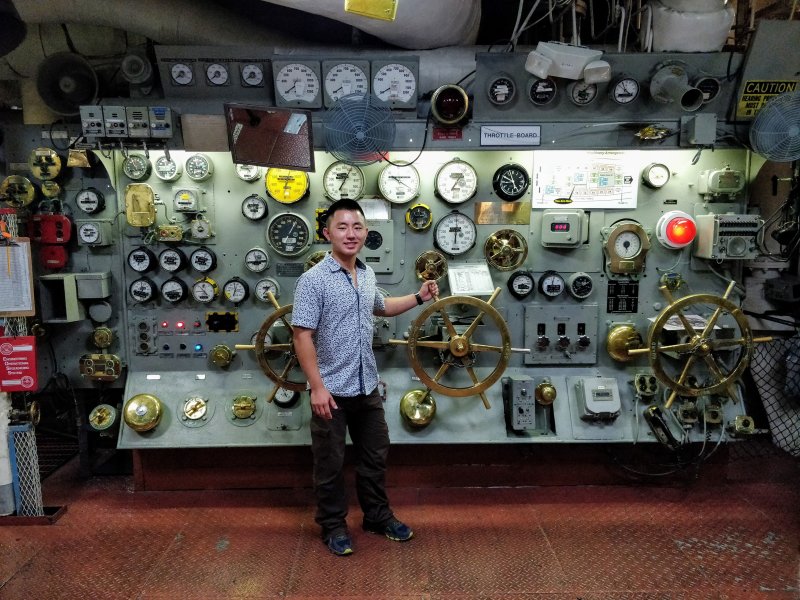
Eric Lu seems to be always moving. In the midst of completing his engineering physics with an emphasis in mechanics degree at PLNU, the senior still finds enough time to engage in his other favorite activities like rock climbing and cycling. Add to the list his new manufacturing internship with Solar Turbines, a subsidiary of the global energy company Caterpillar, and it’s easy to see that he has a pretty full plate.
Lu’s is no stranger to adding work to his college schedule. He has already completed internships with companies like SPAWAR Systems Center and General Motors. His approach to finding and securing this work is strategic, and one that he believes will benefit him once he graduates.
And as employment trends show that more and more companies are setting their sights and hopes on hiring recent graduates with some degree of work experience, the importance of internships for current college students is at an all-time high.
Lu mentions the importance of learning about internship opportunities through professors like Maria Zack, Ph.D., who chairs PLNU’s Departments of Mathematical, Information & Computer Sciences and Physics & Engineering. Zack often hosts events with industry professionals and invites her students. Lu met Solar Turbines employees through her “career dinners” last year.
Then Lu prepared for the internship by working with his career coach from the Career Services. “I transferred here from Purdue University, which is a huge school,” he said. “The PLNU advantage is that I could meet with my Career Services coach on an ongoing basis to review my resume and share my strengths.
The total number of internships a student completes as an undergraduate is a major predictor of positive career outcomes six months after graduation.
Internships Provide Needed Experience
Phil Gardner, Ph.D., is director of the Collegiate Employment Research Institute at Michigan State University. During a presentation at San Diego State University, Gardner highlighted the 48th edition of “Recruiting Trends,” Michigan State’s 2018-2019 report of 3,300 employers seeking new college talent.
Gardner said that employers expect college graduates to possess experience before applying. This shift has drastically changed the process of entering the workforce. His research shows that 77 percent of employers consider “past workplace performance” in the recruiting process.
__________
Who are you called to be?
Pursue your purpose at PLNU.
__________
How Can Students Get Internship Experience?
Lindsey Lupo, Ph.D., co-chair of the Department of History and Political Science and director of the PLNU Institute of Politics & Public Service, affirms the need for students to acquire experiences in the greater community. Internships are required for students majoring in political science and international studies.
“The political science major can lead you to so many different careers, besides law,” she said. “Students who major in international studies can go into social sciences, nonprofit management, and business.”
She tells students to make the most of their internships. “Internships make classroom content come to life,” she said. “Students can discern their career options.”
“Internships make classroom content come to life. Students can discern their career options.”
– Lindsey Lupo, Ph.D.
Making the Most of Opportunities
Lupo encourages students to go to coffee with professionals at their internships. The required assignments for interns include asking questions about salary ranges and graduate degrees.
Students can even discover the fields that they don’t want to pursue. “I meet with students who were planning to spend thousands of dollars and hours in law school,” said Lupo, “only to complete an internship at a law firm and realize that they don’t want to practice law. That learning saves so much time and money.”
Students can also learn valuable skills that they didn’t expect. Last year, Lu applied for an internship at Tesla that he didn’t get. “I learned how to recover quickly,” he said.
Long-term Benefits of Internships for Students
The total number of internships a student completes as an undergraduate is a major predictor of positive career outcomes six months after graduation, according to a 2017 study from Mount Holyoke College titled “The Impact of Undergraduate Internships on Post-Graduate Outcomes for Liberal Arts.”
A 2016 Forbes feature declared that internships are “the ultimate return on investment for today’s college student.”
As college students face increased tuition and accumulating debt, the pressure rises to connect their degrees to their careers. According to the National Association of Colleges & Employees (NACE), “a paid internship with a company in the private sector is, by far, the most beneficial in promoting job-search success, because it is the most deliberately designed and the most consistently funded for converting interns into full-time, entry-level hires.”
“A paid internship with a company in the private sector is, by far, the most beneficial in promoting job-search success, because it is the most deliberately designed and the most consistently funded for converting interns into full-time, entry-level hires.”
Chrissy Conde, who manages regional talent acquisition for Enterprise in Southern California, visited PLNU and highlighted the importance of converting interns into employees at her company. “While internships can lead to increased rates for job offers and salary ranges, PLNU offers a unique perspective on internships and calling.” According to Conde, Enterprise works to convert at least 45% of their student interns to management trainees.
“Internships are really about passion,” Lu believes. “The world is really big, and when you work on an internship, the world gets smaller.”